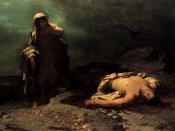There are many principles that exist in Sophocles' "Antigone". Three that are at stake in the central conflict are; the role of gender, pride, and human law vs. moral/divine law. Within these principles, the principle of power is intertwined.
The principle of the role of gender is explored throughout "Antigone". The role of gender is a key principle as Creon relates women to being inferior to men. They must obey a man's every command, and if they should go against man, then they should be punished. Antigone opposes this role every opportunity she obtains. She tries to gain power by burying her brother and standing up to King Creon. It opens up by Antigone speaking to Ismene. Antigone wants to giver her brother, Polyneices, a proper burial even if this means she will be violating the decree of the king. Ismene reminds Antigone that they are only women. This means that they are vulnerable.
Ismene feels she is powerless, while Antigone wants to gain power as a woman. "I will not put dishonor on them, but to act in defiance of the citizenry, my nature does not give me means for that," stated Ismene. (89-91) Here it is expressed that the role of women is limited. She says her nature does not enable her to do so.
Antigone feels that the role of women might be limited, but by giving her brother a proper burial, she is taking a stand. "I shall be a criminal - but a religious one, " states Antigone. (84-5) Through martyrdom Antigone can gain power. Since women are oppressed in Greek society as stated by Ismene, martyrdom is the only means of gaining power. Antigone has obligations to two men, Creon and Polyneices. By marrying Haemon she will have yet another man...



Antigone
I was really having a hard time understanding this play. After reading this essay I have a really good understanding of its content. I am glad this essay was available to be for insight.
2 out of 2 people found this comment useful.